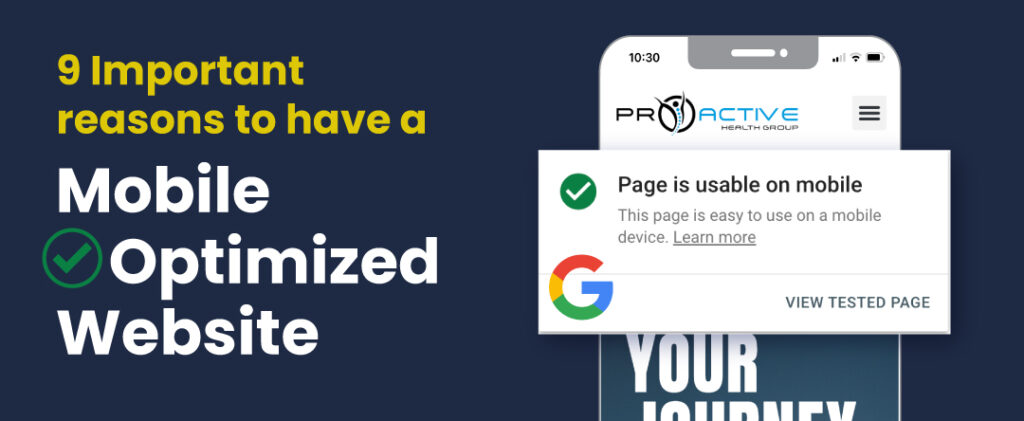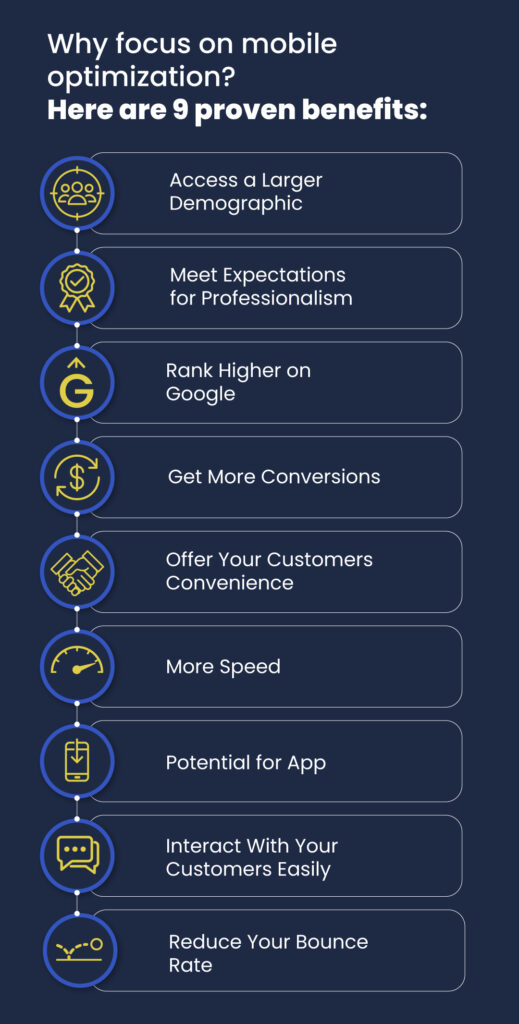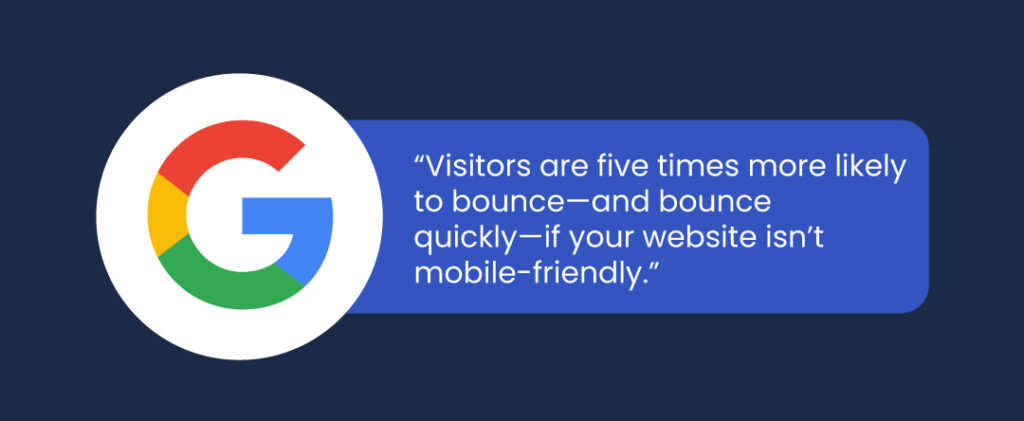
David Murphy, the Co-Founder of Mobile Marketing and mobile optimization expert, apparently once said:
"The future of mobile is the future of online. It is how people access online content now."
Like so many quotes online, it’s difficult to track exactly when or where he first said this. Search for the quote, and you end up heading down a rabbit hole of repetition.
We’re not saying the sentiment itself is wrong. In fact, Americans check their smartphones 96 times per day—on average. And that’s just Americans!
But there’s a lesson in this for business owners.
You want to make it easy for your smartphone-using customers to find you, your business, and your products or services. You don’t want them heading down a rabbit hole, frustrated by a website designed only for desktops.
For today’s businesses, mobile site optimization is vital—whether you’re online, offline, or hybrid.
Below, we define “mobile optimization” for those unfamiliar with the term. Then, we offer up nine factors behind the importance of mobile optimization.
So, What Exactly Is Mobile Optimization?
Phones became internet-compatible around the year 2000 (albeit it was a very watered-down version at this time).
Since then, people have been using them to visit websites, chat with friends on social media, video-call loved ones in other cities or countries, and shop for new shoes. Essentially, they’re now no different from our desktop computers or laptops.
However, viewing a website on a four-inch screen with touch controls is a far different experience from a computer with a keyboard and mouse.
In the early days of internet-capable smartphones, websites didn’t show up correctly. Their design elements appeared chaotic, and they took too long to load. It was difficult to navigate between pages or search for products or services.

Mobile optimization is the art of tailoring a website or application to deliver an exceptional user experience on smartphones and other mobile devices. Techs and designers engaging in this practice aim to ensure a site is fast, responsive, and visually appealing on mobile.
The field has come a long way since the Y2K era. Today, you can expect a seamless experience on almost every site you visit using your phone. But there are stragglers—those businesses yet to see the value in appealing to the vast mobile audience.
Are you one of them?
Why a Mobile-Friendly Website Is Worth the Investment
Today, we have access to a greater arsenal of tools for web design than ever before. Many of these tools are specifically designed to help you optimize your website for mobile use.
But as with any tool, they’re only as good as their operator.
If you didn’t build a mobile-optimized site, it’s probably failing your mobile users on many fronts. And there are many reasons—we’ve listed at least nine, in fact—why you should invest precious time and money into fixing this problem.

1. Access a Larger Demographic
The purpose of a business’ website is to reach as many potential customers as possible. When your site isn’t optimized for mobile, you cut yourself off from most internet users.
In the third quarter of 2022, 92.3% of people worldwide accessed the internet via mobile phone. This is compared to 65.5% using a laptop or desktop computer.
So yes, computers are still popular. But the average netizen uses their phone for everything from simple searches to prove a point to a friend to booking their yearly dental checkup.
The advice here is simple: optimize for mobile or miss out on lots of customers.
2. Meet Expectations for Professionalism
Today, mobile optimization is the default, so web users expect it.
A mobile visitor can access your site if you haven’t optimized it for mobile, but the experience will be lackluster at best. They’ll immediately realize it isn’t optimized, making your business appear unprofessional and outdated.
If you have a comprehensive desktop-friendly site, you have a lot of wiggle room. You can do a lot to it while still keeping it functional. However, if you add too many elements—invasive ad placement, excessive clutter, overuse of videos—the site becomes cluttered and annoying.
When you optimize your site for mobile users, you have to cut back dramatically. You have to trim the fat to ensure the site loads well on WiFi, data connections, low-end and high-end devices, and other combinations of hardware and connectivity.
In other words, optimizing your site for mobile means your site will work better on all devices. You’ll also gain valuable insights into professional web design best practices.
3. Rank Higher on Google
Everyone wants their website to rank well on Google, and that means landing “high” in the SERPs. Typical advice around Google rankings focuses on SEO and meeting Google’s search essentials.

However, your site’s performance on mobile devices is also considered—and it’s often a neglected component of audits. This means that even if you have an “SEO-perfect” webpage, not optimizing it for mobile users will result in a lower ranking.
4. Get More Conversions
One of the biggest arguments for having a mobile-optimized site is conversions. In most cases, it’s the ultimate goal of a website.
Most business owners want to convert as many visitors into paying customers as possible. After all, that’s how a business gets revenue and grows.
Although mobile users tend to convert less often than their desktop-using counterparts, you still want to capitalize on this audience.
Think of it like this… You’re already winning if your site works beautifully on desktops. Adding mobile-friendly functionality helps you get those fewer but important visitors that prefer to buy on their smartphones.
You can increase your site’s conversions by catering to the mobile crowd.
5. Offer Your Customers Convenience
One of your core tasks as a business owner is to make it simple for a customer—new or existing—to interact with your products or services. You don’t want to stop them from supporting you. That would be counterintuitive.
Mobile optimization boosts the convenience of your site because customers can visit your site anywhere at any time. They don’t have to wait until they get home or return to the office to use a laptop or other device.
6. More Speed
Much of mobile optimization focuses on speeding up your load times. This helps mobile users, but it also helps your site visitors in general. Again, this comes back to giving visitors a positive experience.
Site loading speed, whether on mobile or desktop, is also a factor in SEO. So it might help you rank higher in Google SERPs, too.
7. Potential for App Integration
When you focus on the importance of mobile optimization and take the time to craft the perfect mobile site experience for your customers, you open up another opportunity—one that gives you more access to your target demographic.
You can create an app.
Apps make it much easier for customers to interact with your business and offer you a host of unexpected benefits: notifying customers directly on their locked screens, ethically collecting marketing data, and more.
Not every website owner will want to do this, of course. But if you already have a mobile-optimized site, you already have the foundations of an app. And that makes creating your new app a breeze!
8. Interact With Your Customers Easily
There’s no denying businesses can engage directly with customers when they visit their PC-based site. But mobile sites offer more options.
On the phone, notifications, instant messaging, and face-to-face or voice chat are streamlined.
Plus, you don’t have to worry about the user not having a mic or camera for face-to-face interactions, checking emails for email correspondence, or other time-wasting inconveniences.
9. Reduce Your Bounce Rate
Trust us. You’ll see your bounce rate drop once you optimize your site for mobile.
If your bounce rate is high right now, and you don’t have your site optimized for mobile, it’s likely mobile users are getting fed up with their experience. They visit, and within about 50 milliseconds, they’ve moved on—often to a competitor’s better-optimized website.
Even Google notes that visitors are five times more likely to bounce—and bounce quickly—if your website isn’t mobile-friendly.
Get Help With Mobile Optimization Today
So, there you have it: the top 9 reasons for the importance of mobile optimization.
Has this got you wondering how mobile-friendly your website is? Are you frantically messaging your URL to friends and family asking them to take a look for you?
If you’re dealing with a mobile-unfriendly website, MK Way can help. Our team of web experts can assist you with various digital marketing services designed to optimize your site for mobile use and drive more satisfied users to your business.
If you need help with mobile optimization, schedule a free consultation with an MK Way web design expert.



